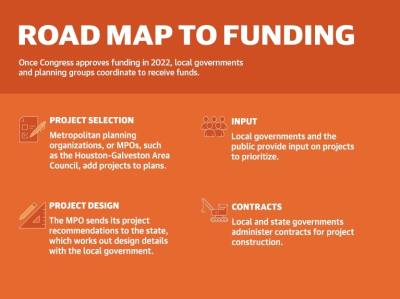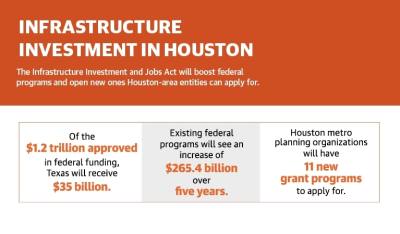Texas is expected to get about $35 billion of that funding, while existing federal aid programs will receive an influx of $265.4 billion over five years, according to Chandra Bhat at The University of Texas.
Craig Raborn, transportation director of metropolitan planning organization Houston-Galveston Area Council, said Houston-area entities will have 11 new grant programs to apply for. Raborn said the bill’s broad scope will increase funding to programs, such as the Surface Transportation Block Grant, which is seeing a 24% increase in funding.
“It’s a big bill; there’s a lot in it,” Raborn said. “And so it’s going to take a lot of time for agencies like ours to find and match the pieces to the needs they have.”
Raborn also highlighted new programs that could target resiliency and flood control as areas of interest, such as the PROTECT Program, which provides up to $8.7 billion to help reinforce surface transportation routes and evacuation routes.
However, Raborn cautioned that other federal funding and regulatory hurdles needed to be cleared before H-GAC or other planning organizations can begin discussing funding allocation.
“It’s going to take a fair amount of time for [all of the funding announcements] to work their way through their processes before we start seeing that,” he said.
Once the new appropriations bill makes its way through Congress in 2022, Raborn said H-GAC plans to get public input into future transportation planning in the spring.
H-GAC is updating the region’s four-year, 10-year and 25-year transportation plans, which will receive input from the public and local governments before informing the state of the prioritized projects to receive funds. Raborn said updates could be complete by the first and second quarters of 2023.
He said it is too early to tell how much of the funding the Greater Houston area will receive and which projects will be allotted funds.
Susan Lent, an adviser to the city of Houston, said the city might be a candidate for a $1.4 billion grant for weather preparation projects, a $250 million congestion relief program and a $3 billion railroad grade crossing elimination program.
Construction could begin soon on a high-speed rail from Houston to Dallas by privately owned Texas Central. Lent said a $36 billion program for high-speed rail lines is for governmental entities, but private entities can be subrecipients.
Shawn Arrajj contributed to this report.







